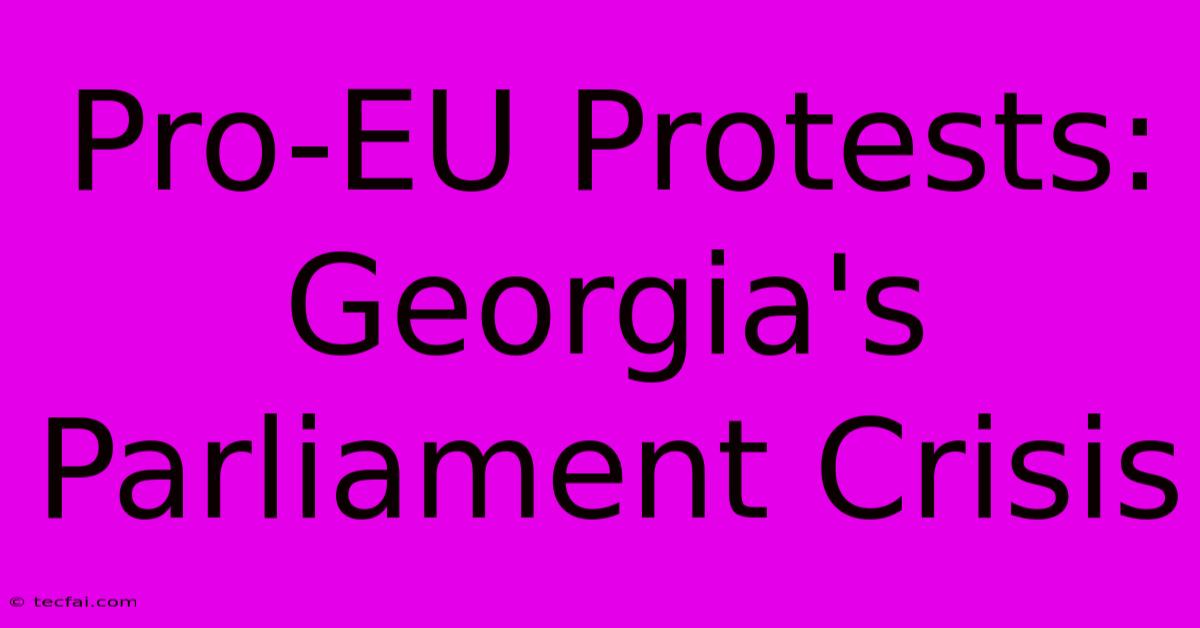Pro-EU Protests: Georgia's Parliament Crisis

Discover more detailed and exciting information on our website. Click the link below to start your adventure: Visit Best Website tecfai.com. Don't miss out!
Table of Contents
Pro-EU Protests: Georgia's Parliament Crisis
Georgia, a country aspiring for European Union membership, found itself embroiled in a significant political crisis in March 2023, sparked by a controversial bill and fueled by widespread pro-EU protests. The events highlighted the deep divisions within Georgian society regarding its geopolitical future and the country's relationship with Russia. This article delves into the key events, the reasons behind the protests, and the implications for Georgia's path towards EU integration.
The Spark: The "Agents of Foreign Influence" Bill
The immediate trigger for the massive demonstrations was a proposed law dubbed the “agents of foreign influence” bill. This legislation would have required any non-governmental organization (NGO) receiving more than 20% of its funding from foreign sources to register as a “foreign agent.” Critics immediately condemned the bill, drawing parallels to repressive laws used in Russia to stifle dissent and restrict civil society.
The bill's ambiguous wording and broad scope raised serious concerns about its potential to cripple independent media, human rights organizations, and other crucial elements of a healthy democracy. Many feared it would be used to silence critical voices and further limit freedom of speech already under pressure in Georgia. This perception fueled the intense pro-EU protests that followed.
The Protests: A Show of Strength for EU Membership
The proposed law ignited widespread outrage, leading to massive protests in Tbilisi and other cities across the country. These demonstrations were notable not only for their size but also for their overwhelmingly pro-EU sentiment. Protesters waved EU flags, chanted slogans demanding European integration, and directly connected the bill to Russia’s influence.
The protests were remarkably diverse, uniting opposition parties, civil society organizations, students, and ordinary citizens united in their opposition to the bill and their desire for a closer relationship with the EU. This unified front demonstrated the significant public support for a European future and underscored the potential consequences of succumbing to external pressures. The sheer scale of the pro-EU protests put immense pressure on the Georgian government.
The Government's Response and the Bill's Withdrawal
Initially, the ruling Georgian Dream party defended the bill, claiming it was necessary to increase transparency. However, facing mounting international condemnation and sustained massive pro-EU protests, the government eventually withdrew the bill. This decision, while seemingly a victory for protesters, did not entirely quell the concerns about the government's commitment to democratic principles and its susceptibility to external pressures.
Implications for Georgia's EU Path
The crisis surrounding the "agents of foreign influence" bill and the subsequent pro-EU protests have significant implications for Georgia's prospects of joining the European Union. While the bill's withdrawal is a positive step, it highlights the deep-seated challenges Georgia faces in its efforts to meet the EU's standards for democracy, rule of law, and human rights.
The EU has consistently emphasized the importance of democratic reforms and respect for fundamental freedoms as prerequisites for membership. The events surrounding this controversial bill serve as a stark reminder of the work that still needs to be done to strengthen democratic institutions and ensure a genuinely pluralistic society.
Conclusion: The Ongoing Struggle for a European Future
The pro-EU protests in Georgia underscore the country's strong desire for European integration and the significant challenges it faces in achieving that goal. While the immediate crisis surrounding the "agents of foreign influence" bill has subsided, the underlying tensions and divisions remain. The events served as a critical test of Georgia's commitment to democratic principles and its ability to navigate external pressures. The path towards EU membership continues, but the struggle for a genuinely democratic and European Georgia is far from over. The success of this journey will depend on sustained commitment to democratic reform and a robust defense of fundamental freedoms.

Thank you for visiting our website wich cover about Pro-EU Protests: Georgia's Parliament Crisis. We hope the information provided has been useful to you. Feel free to contact us if you have any questions or need further assistance. See you next time and dont miss to bookmark.
Featured Posts
-
Ulan Sa Luzon Dec 2 Shear Line
Dec 01, 2024
-
Vols Defeat Vanderbilt Final Score
Dec 01, 2024
-
Ohio States Big Ten Title Hopes
Dec 01, 2024
-
Matildas Vs Brazil 2 1 Loss Highlights
Dec 01, 2024
-
John Report Wwe Survivor Series 2024
Dec 01, 2024
